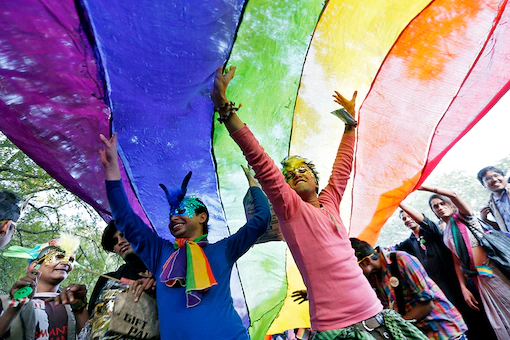Way before India’s own LGBT community organized itself, there were organizations created by the South Asian diaspora. Trikone in the USA, Khush in Canada, Shakti in the UK: these organisations set the pace in the 80s and 90s and helped provide the LGBT community in India with much-needed support in the form of an international network. Earlier this week, the British Academy and the University of Glasgow organised an online panel discussion on the subject of “Desi Diasporas and LGBTQ+ Activism,” where many of the pioneering activists of those times came together to talk about their experiences.
Broadcaster DJ Ritu recalled the excitement of the first meeting of Shakti in London in 1988, saying “To be sitting around a table with so many other LGBT South Asians was like coming home. It was really something special. Shakti changed my life and the lives of a whole generation.”
Shakti was famous for its disco nights, featuring the best of South Asian dance music, which became very popular with the non-South Asian local crowd as well. This eventually led to the setting up of Club Kali, which today is one of London’s most successful LGBT clubs.

Shakti was inspired by Trikone, an organization set up in San Francisco in 1986 by a group of young Indian engineers. In a time before the Internet, Trikone’s big initiative was a free quarterly newsletter where it published articles on issues relating to the LGBT community from South Asia, which included Sri Lanka, Bangladesh, Nepal and Pakistan. Trikone’s circulation received a boost when major Indian magazines like Society wrote about it. Novelist Sandip Roy recalls putting an ad in the pen pals section in Trikone when he was an engineering student in Kolkata. “I received so many letters from so many parts of the world. I no longer felt like I was alone. The letters kept coming even four years later when I moved to the US.”

The Trikone newsletter played a major role in galvanizing the LGBT community in the 80s and 90s and Roy would eventually become the editor, till the publication finally folded in 2014. “I would solicit articles from famous authors like Vikram Seth and Ruskin Bond as well as upcoming Indian activists. We were all volunteers, happy to contribute our resources. We even organized conferences where we would raise money to bring people from South Asia as speakers,” he says.
Both Trikone and Shakti started off as cultural organizations, with the limited objective of bringing people together and forging a new LGBT identity. Get-togethers would be arranged for Eid, Diwali and Baisakhi. South Asians were not quite ready then for activism in the form of marches and parades – that would come much later.
Filmmaker Ian Iqbal Rashid, one of the founders of Khush in Canada and the prime mover for the popular Desh Pardesh festival in Toronto, says, “The issues we faced in those days are still relevant today. But the South Asian community has become more segmented, especially after 9/11 and the Islamophobia that followed.”
Trikone, Khush and Shakti are unknown to the new generation. But the LGBT communities of India, Sri Lanka, Bangladesh, Nepal and Pakistan owe them a great debt. Kolkata based LGBT activist Pawan Dhall, one of the hosts at the panel discussion, recalls how many of his friends immigrated to the US, Canada and the UK over the years. “They just wanted to get away from an environment where they could not be themselves,” he says. That they would go on to set up organizations to provide the intellectual impetus for the LGBT movement back home was an unforeseen consequence of the brain drain.













Good info Dibeyendu .
Yesterday ‘Garima Gruh’ an ashram for Transgender , under a C.Govt scheme , was inaugurated at Ulhasnagar .My friend Adv.Trupti Patil an activist for woman rights and member of our Dombivli Mahila Mahasangh, was the Chief Guest.